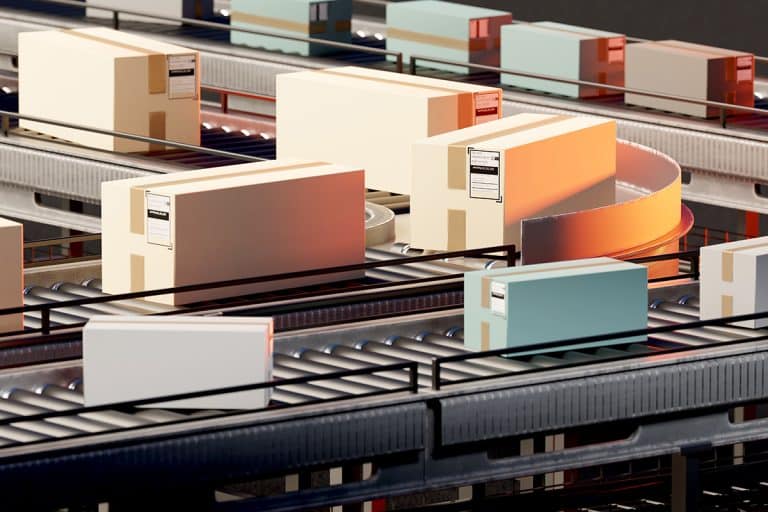The e-commerce sector in the UAE – as also in the wider GCC – could soon face major cost-related challenges in the last-mile delivery segment amidst rising geopolitical conflicts leading to tariff wars and turbulence in the logistics business, adversely impacting cheap imports from China.
The anticipated crisis, however, could turn out to be a boon for the domestic logistic industry in the UAE, compelling sectoral players to innovate and explore efficient and cost-effective local alternatives to navigate the global uncertainties, an industry expert said.
“The surge in online shopping in the UAE – and also GCC region – is paving the way for faster growth in the logistics industry, and the UAE is set to be at the forefront of this transformation,” Alan Coughlan, a Dubai-based entrepreneur and Founder and CEO of Lansil Global, a global supply chain solutions provider for e-commerce brands, told Arabian Business.
“I believe the anticipated spike in revenues in the e-commerce sector in GCC – the region is projected to see about 10 percent growth annually to reach $47 billion by 2029 – will shape the future of the logistics industry in the region, with Dubai, the UAE’s premier logistics hub, set to be the main beneficiary,” he said.
Coughlan said geopolitical conflicts are affecting fuel prices and disrupting major sea routes such as the Bab al-Mandab Strait, leading to tariff wars.
Trade tensions and regulations – mainly between the US and China – are also set to become a huge area of turbulence for logistics businesses.
“For instance, if China was banned from using a US-patented voice detection technology in a digital camera, a UAE logistics company could therefore face supply chain delays and increased operational costs while trying to find another product or source the same speaker from another country,” he said.

Logistics sector the staple of UAE’s burgeoning economy
Coughlan said the logistics sector has long been a staple of the UAE’s burgeoning economy, estimated to account for about 8 percent of the country’s GDP, driven by the recent surge in e-commerce activities and an advanced infrastructure and busy trade hubs.
“I firmly believe that while this growth is testing the stability of UAE supply chains, it also presents significant opportunities for innovation that will shape the industry’s future in the next few years.
He said one of the key growth drivers across the logistics industry in the coming years is the increased demand for online shopping.
“With an internet penetration rate above 90 percent across the Gulf, residents have become accustomed to purchasing goods online.”
The fashion segment emerged as the most popular category for online shoppers, with revenue exceeding $2 billion last year in the UAE, followed by $770 million for furniture.
“The rapid adoption of ‘buy now, pay later’ and the emergence of discount sites has also significantly encouraged spending among UAE residents, boosting demand for products from China,” Coughlan said.
He said in Saudi Arabia, e-commerce users are also on the rise and are driven by the Kingdom’s effort to enhance digital infrastructure and promote online retail.

International players shaping the e-commerce landscape
The Lansil Global chief executive said despite the success of many local e-commerce brands, Amazon remains the market leader in online sales in the UAE – Statista estimated the US major’s market share at 32 percent in 2022 – though the company has been facing the increased competition of late from local players such as Noon and Namshi, alongside established retailers such as Sharaf DG and Carrefour.
He, however, said the market is seeing a major upheaval with Chinese retail giants Shein and Temu making major disruptions with their direct-to-consumer (DTC) fulfillment model, notching up record-breaking sales in recent years.
According to MobiLoud, as of July 2023, the Temu app had over 130 million downloads in under a year, whilst Shein had 251 million by the end of 2023, indicating their growing presence in the market.
Coughlan said the success of DTC fulfillment has become so disruptive that it is threatening Amazon, which is planning to launch a discount store similar to Temu and Shein.
“The [US] company is reportedly striking deals with merchants to store inventory in China and fulfill orders internationally at a much lower price,” he said.
Coughlan said if Amazon’s upcoming discount store allows independent sellers to keep inventory in China and ship to customers globally, then more e-commerce brands – practically everyone – would be able to compete with Shein and Temu.
“The UAE is set to benefit greatly from the rising demand for low-cost Chinese goods,” he said.

Looming threat to DTC fulfilment model
The Lansil Global chief executive, however, said there is a looming threat to the DTC fulfillment model.
He said according to the GCC Unified Guide for Customs Procedures, parcels valued under SAR 1,000 (approximately AED 979) do not require customs duties payment.
“This means that if the constant import of cheap goods from China affects local retailers, the GCC could decide to scrap the SAR 1,000 threshold altogether,” he said.
The EU and US are already discussing such measures.
Coughlan said even Dubai briefly reduced the threshold to AED 300 in 2023 before changing it back to the GCC limit a few months later.
He said another major issue for the e-commerce sector in the UAE and GCC will be the rising last-mile delivery cost – which accounts for 50 percent to 60 percent of total shipping costs – amid rising inflation and fuel prices.
“The industry is under increasing pressure to become more efficient and cost-effective,” he said, adding that online consumers are getting used to the idea of having their goods delivered for free, leading e-commerce sellers to bear the cost by including it in the total price.
Coughlan said there is no easy way to minimise costs in a labour-intensive industry like last-mile delivery.
“The only promising solution is to reduce the dependency on labour by shifting to drones and self-driving vehicles.
“While there are plenty of startups across the UAE trying to make this a reality, the solution remains light years away from widespread implementation,” he said.








